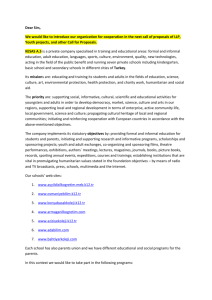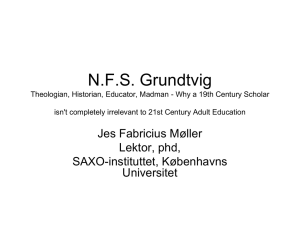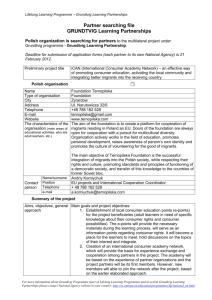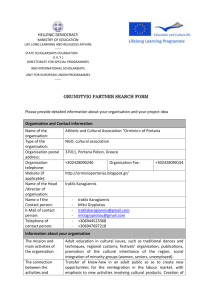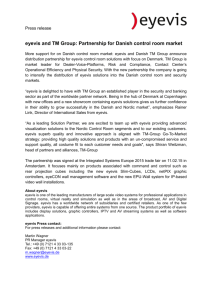Grundtvig`s thinking in a historical and contemporary
advertisement
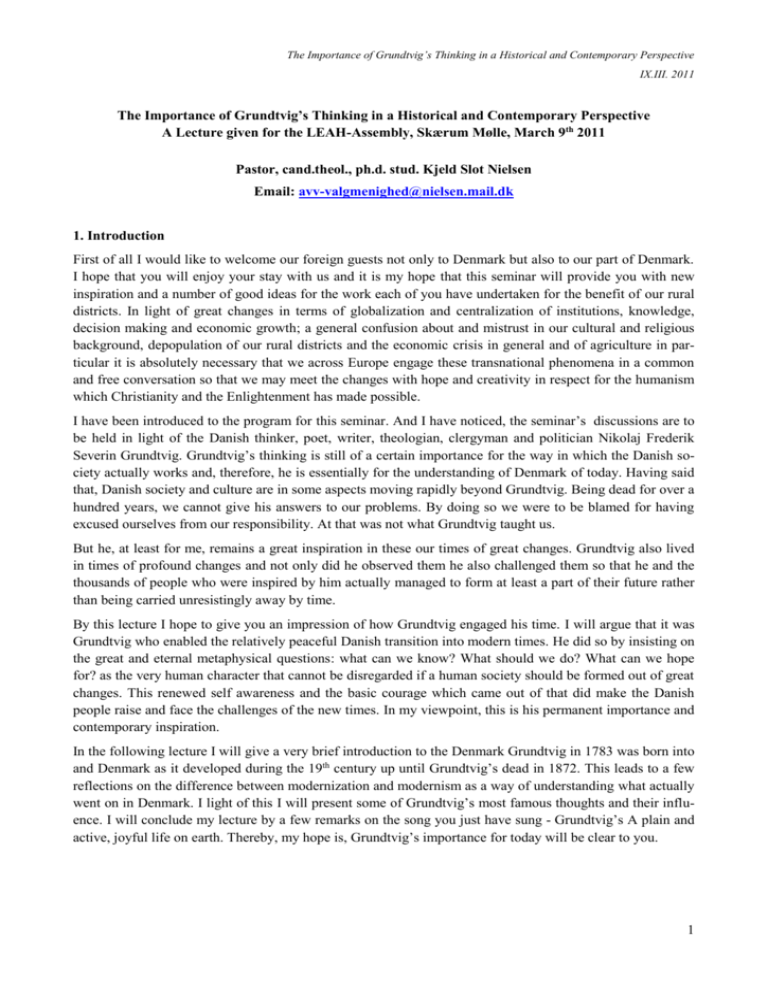
The Importance of Grundtvig’s Thinking in a Historical and Contemporary Perspective IX.III. 2011 The Importance of Grundtvig’s Thinking in a Historical and Contemporary Perspective A Lecture given for the LEAH-Assembly, Skærum Mølle, March 9th 2011 Pastor, cand.theol., ph.d. stud. Kjeld Slot Nielsen Email: avv-valgmenighed@nielsen.mail.dk 1. Introduction First of all I would like to welcome our foreign guests not only to Denmark but also to our part of Denmark. I hope that you will enjoy your stay with us and it is my hope that this seminar will provide you with new inspiration and a number of good ideas for the work each of you have undertaken for the benefit of our rural districts. In light of great changes in terms of globalization and centralization of institutions, knowledge, decision making and economic growth; a general confusion about and mistrust in our cultural and religious background, depopulation of our rural districts and the economic crisis in general and of agriculture in particular it is absolutely necessary that we across Europe engage these transnational phenomena in a common and free conversation so that we may meet the changes with hope and creativity in respect for the humanism which Christianity and the Enlightenment has made possible. I have been introduced to the program for this seminar. And I have noticed, the seminar’s discussions are to be held in light of the Danish thinker, poet, writer, theologian, clergyman and politician Nikolaj Frederik Severin Grundtvig. Grundtvig’s thinking is still of a certain importance for the way in which the Danish society actually works and, therefore, he is essentially for the understanding of Denmark of today. Having said that, Danish society and culture are in some aspects moving rapidly beyond Grundtvig. Being dead for over a hundred years, we cannot give his answers to our problems. By doing so we were to be blamed for having excused ourselves from our responsibility. At that was not what Grundtvig taught us. But he, at least for me, remains a great inspiration in these our times of great changes. Grundtvig also lived in times of profound changes and not only did he observed them he also challenged them so that he and the thousands of people who were inspired by him actually managed to form at least a part of their future rather than being carried unresistingly away by time. By this lecture I hope to give you an impression of how Grundtvig engaged his time. I will argue that it was Grundtvig who enabled the relatively peaceful Danish transition into modern times. He did so by insisting on the great and eternal metaphysical questions: what can we know? What should we do? What can we hope for? as the very human character that cannot be disregarded if a human society should be formed out of great changes. This renewed self awareness and the basic courage which came out of that did make the Danish people raise and face the challenges of the new times. In my viewpoint, this is his permanent importance and contemporary inspiration. In the following lecture I will give a very brief introduction to the Denmark Grundtvig in 1783 was born into and Denmark as it developed during the 19th century up until Grundtvig’s dead in 1872. This leads to a few reflections on the difference between modernization and modernism as a way of understanding what actually went on in Denmark. I light of this I will present some of Grundtvig’s most famous thoughts and their influence. I will conclude my lecture by a few remarks on the song you just have sung - Grundtvig’s A plain and active, joyful life on earth. Thereby, my hope is, Grundtvig’s importance for today will be clear to you. 1 The Importance of Grundtvig’s Thinking in a Historical and Contemporary Perspective IX.III. 2011 2. Denmark before and after Grundtvig During the 18th century Denmark had become a rather wealthy nation with a rather significant international importance due to the fleet of commerce protected by the northern seas most powerful navy. Denmark was at that time a state of different nations. Norway was under Danish rule and a number of states in northern Germany belonged to the Danish crown. This mix of nations, people and languages was held together only by the monarchy and its Lutheran belief. The power of coherence was the absolute monarch and the state church and the absolute obedience of its subjects. In this autocratic and theocratic state the subjects had to follow the Kings law in deeds as well in beliefs. Other religions were forbidden by law and the ministers of the state church were by law forced to ensure whether the people observed the true faith or not. Not to attend church was a criminal act and was so punished. Most of the population lived in the rural districts under the absolute rule of the great landowners, the Crown and the nobility. Farmers and peasants had only a few possibilities for education – most and foremost they were taught to read the catechism. When Grundtvig was born in 1783 as a son of a minister in the Danish Statechurch all of this were about to be changed radically. Not only were the new principals of the Enlightenment regarding democracy and liberty on the move but also the balance of power was tipping throughout of Europe. So when Grundtvig closed his eyes for the last time in 1872 Denmark was a poor and young democracy of no international significance what so ever. Denmark had tried to stay neutral in the Napoleon Wars for the sake of their overseas trading. But the importance of the Danish navy did in fact constitute a great problem for the parties of the war. Therefore the British navy stole the Danish fleet in 1807 after having launched the first terror bombardment on civilians ever in history. The navy had been taken, Copenhagen was set on fire and that forced Denmark to enter the war on Napoleons side. After his defeat Denmark lost Norway as a result of the peace negotiations in Vienna in 1813 and the state went bankrupt the same year. During and after the Napoleon Wars a romantic sensibility for nationality, common language, national history swept over Europe. Philosophers like J.G Herder, the principles and standards from the American declaration of Independence and first and foremost from the French Revolution began to win more and more followers. They claimed democracy and the division of power instead of absolute monarchy, civil rights, freedom of belief and speech, education of and competence to common people. This led to two things in Denmark. First of all Denmark became a constitutional monarchy under a democratic constitution in 1849. Secondly, a civil war had begun in the German parts of the nation. They wanted to separate themselves from the Danish Kingdom and be a part of the German community to which they in respect of language and culture actually did belong. Denmark defeated the German separatists, but in 1864 war broke out again and now with the Prussian chancellor Bismarck on the separatist’s side. Denmark was severely beaten and lost 1/3 of its territory and 1/2 of its population. At the same time urbanism and industrialism took on. Yet Denmark was still a nation of peasants and dependent on the agricultural economy. This was the case until 1960. Danish history in the 19th century is a drama. But if you read any Danish history book you will find that these years are referred to as the golden ages! In the streets of Copenhagen you would meet poets and thinkers like Hans Christian Andersen, Søren Kierkegaard and Grundtvig. Art and literature flourished. Power was handed over to the people without any bloodshed, and under the slogan “what is lost externally must be won internally” and with the inspiration of Grundtvig the Danish people and most and foremost the peasants became self-aware and took part in the democracy, the restoration of the country and the creation of new institutions at a scale that surely justifies the notion of a golden age. 2 The Importance of Grundtvig’s Thinking in a Historical and Contemporary Perspective IX.III. 2011 In order to summarize this short tour de force through Danish history it might be helpful to make a distinction between modernization and modernism. ‘Modernization’ is a term for technical improvements that improves the basic need for food, housing, health, communication et cetera. Therefore you can have a modernized way of living within a culture and a political system which is so far from modernity as possible. A theocratic, medieval government can easily be combined with a life filled with modern goods. To have what I have called modernism on your hands four criteria needs to be observed. First, man’s relation to nature should be a pragmatic one with the one purpose to satisfy basic human needs. Secondly, public life must be ruled by strictly universal, rational and human principals. The personal space is strictly private and cannot be subjected to public scrutiny. Thirdly, man’s relation to himself should be characterized by autonomy. This idea of personal autonomy and authority did of course lead to the claim for democracy in terms of the people’s right to decide for itself. And finally, man’s relation to God for this to be in line with modernity it should be a matter of personal choice and belong to the personal space. Denmark was transformed in the 19th century to a modern community formed by the rule of law in line with the visions of the European Enlightenment and Grundtvig was a key figure in this transformation. I will turn to that now. 3. Grundtvig’s key-notions 3.1. Humanity and ‘folkelighed’ One of the most interesting things about Grundtvig is that he lived in a constant self encounter. What he at one time in his life had vigorously defended he later on attacked with the same strength. He had the courage to let experience and new insights guide and correct him. Being one of our constitutions founding fathers it must therefore not be forgotten that he for a long period was loyal to the monarchy in a somewhat reformed form and he ended up voting against the constitution because it in some aspects in his view was not radical enough in the way it defined the citizen’s degrees of freedom and responsibilities. But he did provide the new democracy with a foundation, which was needed and still is important. Old Denmark was held together by the subjects loyalty to crown and alter. But with the new constitution and democracy and liberty of religion there was a need for a new power of coherence. Democracy is only a certain way to govern and to handle power. It is the most gentle and peaceful way of doing so ever yet to have been seen. But it cannot do as a way of seeing life and it cannot in itself provide common visions and solutions. It simply does not say anything about the people which are under the democratic rule. In need of such a power of coherence Grundtvig began to rethink what it actually is to be human. What can be said about us and not of anything else that was for Grundtvig that metaphysical question from which everything else emerges. Man, he said, is not a monkey. A monkey can be taught a lot and can by proper training do a lot of things, so that you actually may think about a monkey that it is almost human. But the only thing a monkey is capable of is to imitate. The monkey is not self aware and cannot reflect on his own life and its place in the world. That is precisely what characterizes man. To be man – to be human – is to be denied the security in imitating others. If we do so, then we – at least in the long run – will silence our very humanum. Human life, said Grundtvig, is a divine experiment of dust and spirit. ‘Divine’ taken in the most broad sense of the word – that is something given to humans. And experiment because everything can come out of man’s constitution. ‘Dust’ refers to our very place in life that is constantly threatened by dead. And ‘spirit’ is Grundtvig’s word for man’s self relatedness. But in order to be self related, you need something 3 The Importance of Grundtvig’s Thinking in a Historical and Contemporary Perspective IX.III. 2011 outside yourself – at standpoint – wherefrom you can actually see yourself. To be self related has nothing to do with some tendencies within psychology, where self relatedness is a movement within you. Only from within a third dimension you can actually see yourself, reflect on yourself and think and act otherwise than you may have done. This third dimension – needed for man to be just man – is for Grundtvig the very historic life of the people. Grundtvig spoke of folke-lighed – something like “the way you reflect or look like your people”. It is almost impossible to translate into English. The dictionary suggests ‘national’ but Grundtvig was far from being nationalistic in any chauvinistic or exclusive sense of the word. As I have tried to underline, is folke-lighed, the basic fact that you always find yourself in a certain context. A historic and dynamic context expressed in language, history, common myths, songs, religious heritage and common problems. Further, you are a part of the web between the dead and the unborn, you are dependent on other people and they depend on you. You are tied to them because you are tied together in a common destiny – and that is your place in the world. So in order to become yourself, i.e. to be self related in a transparent way, you must go to your place in history and that is your place in your people, and there you will find yourself and what is expected of you. Folkelighed is therefore a word for identity; identity taken in its dynamic sense of the word. Folkelighed is related to becoming instead of being, werden instead of sein, ipse instead of idem. That is also to say that the notion of the Danish people is far from being exclusive or chauvinistic from in Grundtvig’s point of view. Actually, Grundtvig asserted strongly, that being a member of the Danish people was a matter of choice – for the people, who has always lived her and for those foreigners, who come to live her. All belong to the people if they want to find their place and responsibility within in the ongoing history of the Danish people and if they try to make the Danish language their own. This notion of ‘folkelighed’ was not only Grundtvig’s offer to a new and modern power of coherence. It also shaped some of Grundtvig’s other key notions. 3.2. The school for life What Grundtvig wanted was to prevent democracy from falling into the hands of the elite, be it economical or educational. It was the upper middle classes – the bourgeoisie – who had made the transition from the old monarchy to modern democracy come true because they had the means and the interests in doing so. The common people – and first and foremost the peasants – also had an interest in taking part in the government of the country, but they obviously was in need of the means. Grundtvig went in the 1830s to England to study and in the course of that visit he got acquainted with the English colleges. The way students og teachers lived and studied together was him a great inspiration and this type of school became the matrix for one of Denmark’s greatest contribution to the world heritage – namely the folk high school or in Danish: højskolen. These schools should prepare the youth – and especially the in a classical sense: the uneducated youth – to take part in the new democracy. The first folk high school was raised in Rødding in 1844. The folk high schools are to give its students the self awareness, pride and responsibility that is necessary for them to be active participants in society. And the means by which this goal should be obtained is history, myths, songs, literature, poetry and a solid knowledge of the way society works. There are no examinations and neither degrees nor diplomas are given. It is with Grundtvig’s own expression a school for life – not a life for the school. The students often could take lessons in agriculture, handcraft, fishing and other practical items. But the main goal was to make the people worthy of their new won power. 4 The Importance of Grundtvig’s Thinking in a Historical and Contemporary Perspective IX.III. 2011 Grundtvig’s school visions became a great success – thousands and thousands of people went to a folk high school. And they brought back with them a sense of optimism and a lot of energy. They began to form their own local enterprises based on the vision for a living democracy they had met. Especially the peasants began to organize themselves politically and economically in smaller and larger cooperatives. They established their own dairies, slaughter houses and bacon factories, distribution nets and so on and thereby they could keep the profits within their own systems and decide for themselves. They also took upon them to build local assembly halls in the villages meant for gymnastics, education, public lectures, singing, dancing and so on. These assembly halls actually served as local folk high schools. The pride and optimism which fled from all this activity turned Denmark into a solid democracy with the highest possible degree of trust between politicians, authorities and the people. It has formed a society where “a few has to much and even fewer to little”. Today we still have folk high schools in Denmark – heavily supported financially by the state, because the state due to the legacy of Grundtvig has an interest in maintaining such a free school form. Grundtvig’s school visions have also spread to the primary school both public and the so called free or private primary schools. 3.2. Christianity as opinion and faith Grundtvig insisted on that faith was not a school matter. In old Denmark faith – that is the individual’s personal position to the gospel – was a state matter. But now with the free constitution only a person’s actions was at matter for the state and the law. People were now free to worship God according to their consciousness and other beliefs just as long it did not violate the laws of the country in general. This did not mean, however, that Christianity did not belong in school and in the public life in general. But Grundtvig distinguished between two aspects of the Christian faith. The one aspect, the universal aspect, was concerned with the understanding of creation, man and ethics. The other aspect, are the specific Christian items such as the teaching about Christ, the Holy Spirit, the Church, the sacraments and teachings about the resurrection and the worlds final destiny in God’s all embracing grace and love. These specific, Christian items were only matters for the faith and belonged therefore in the church. The universal aspects on the other hand were not matters of faith, but according to Grundtvig ways of describing our common life. These assertions are more related with universal human experience as they are expressed in art and thought through in philosophy. The reason why Grundtvig could say such things was that he had acknowledged the new scientific standards in natural sciences as well in humanities. Charles Darwin did not tip over Grundtvig’s opinion that God was the creator of heaven and earth and that man was created in the image of God. That man’s ancestor is a monkey does not mean that man is actually a monkey, he said. And thereby he underlined, that religious opinions should be an interpretation of our mere actual status as humans and not a bad scientific explanation of how it all began. How things are questions for science to discuss – the very wonder that the world actually is and the basic fact that we as humans with self awareness and conscious are in this world is a matter for religion to express and under line for the sake of humanity. That is why people can come together from every possible religions or beliefs and be together in school and society. The very impression or feeling that life itself is a given wonder and the very secret or mystery behind every man which calls for respect and generosity is what combine us. Grundtvig was not a fundamentalist. He read the bible not as God’s own words but as word of humans about God. This in combination with his acknowledgement of modern sciences and him pointing out the limits for science is the very reason why we never have had a conflict between science and faith in Denmark. Atheism, 5 The Importance of Grundtvig’s Thinking in a Historical and Contemporary Perspective IX.III. 2011 therefore, is not an actual issue. Theologians in line of Grundtvig do theology in a much more critical and self transparant way than any atheist you could think of. Having said that, one must accept that the ‘wonder of life’ is threatened by dead. And the very task for every human is therefore how he or she maintain courage and hope with dead as a lifelong companion and final destiny. This question cannot be answered with a question from life within. If we are to be able to live with our experience with dead we must ask beyond our common experience. It is in this context the specific Christian faith become relevant. This faith is for Grundtvig not something for us to decide. God has revealed his eternal love – not to the believers or the church – but to the world in his son. Therefore, the gospel claims, God has reconciliated the world with him for all eternity. That he has so conquered dead on behalf of all humanity is what God ensures us at church and he does so in the sacraments. Baptism and the Holy Communion are God’s word to us, neither the Bible nor any other words Grundtvig said. And having heard this there is no other place to go but home and no other things to do than you every day duties. There are in Grundtvig’s view no special Christian community and no special Christian deeds. The Gospel that God has conquered dead for man’s sake is the very comfort and courage to be man in this life. That is to be a part in the ever changing life of the people in fight for life against any type of dead in the public and political life. But the Christian has no special knowledge about this life and it does not need to be christened for the Christian to take part in this life. He simply is obliged to due to his mere humanity and he can do so in light of the promises of faith. 4. Conclusion. Contemporary Perspectives In this lecture I have argued that Grundtvig’s thinking – first and foremost his notion about the people – made the Danish transition from absolute monarchy to a modern democracy to a transformation. Grundtvig was a modernistic thinker in all aspects of his work. Therefore he has had an importance for the whole of Danish society and church in general. His thoughts on a dynamic, historic and open nationality as the power of coherence did create a society based on trust between state and citizens, equal dignity and economically equality. It gave common people and among those first and foremost the peasants the sense of having an effect on the decision making. They were no longer just a silence audience to the changes of time. This new position in public life was a consequence of the self worth and enthusiasm Grundtvig’s thoughts and creation of the folk high school gave them. This was the “plain and active, joyful life on earth based on the nobleness of birth, equal dignity and profoundly mindful of the need for love that only God can give” just to quote the most famous of all Grundtvig’s songs. This achievement and ambition did change the Danish society and culture. But today the picture is somewhat more blurred. Obvious changes in society and culture has in some ways made Grundtvig’s efforts history. And it should be so. But his struggle for every man’s influence not only on his own life but also on the life in the great scale in terms of politics and economics is today under pressure. Globalization makes it different to actually see where those decisions are made which influence our daily and common lives. We cannot encounter the power, it seems invincible or at least unapproachable and that leaves us with the sense of being run down by the general development – development taken as the sheer changing of things. Man’s modern self worth and dignity lays in the ability to make decisive decisions other than what to eat and what television program to watch. And this dignity is threatened. The wrong way things go in the rural districts here in Denmark is one out of its many consequences. 6 The Importance of Grundtvig’s Thinking in a Historical and Contemporary Perspective IX.III. 2011 Recently I came across something the british historian Arnold Toynbee once said. He argues that the true proletarian is not in need for materialistic goods. The true proletarian knows that he has lost his rightful place in history and that he his unwanted in that community which is his rightful home. What such proletarians are ready to do we can only fear. But if we do not stand up to the changes of our time with the same courage as did Grundtvig in his days – as did other great men and women – I am sure that we will continue to alienate more and more people from themselves and their place in history and society. In light of this, Grundtvig’s thinking is as modern and in keeping with the times as ever. 7
